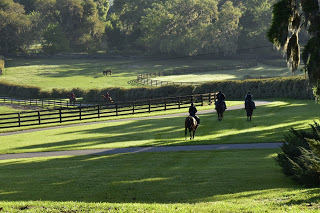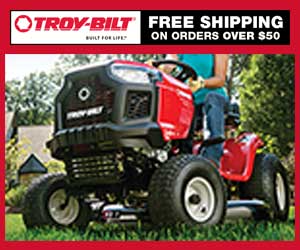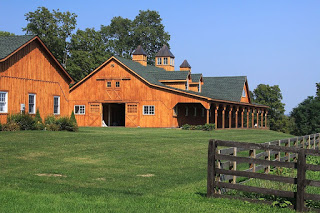
Is a horse farm one of your life’s dreams? Whether you want a small equestrian property for personal enjoyment or you plan to start a business, there are many considerations to include in your evaluation of potential equestrian properties. Buyers looking for raw land to build on, as well as those who want to buy an existing horse farm, can use these essential tips to find the right equestrian property. Find the acreage size that suits your needs and avoid unpleasant surprises due to zoning laws or flooding. Here’s what you need to know before you even start looking:
Initial considerations and research
Purchasing equestrian real estate is a big investment, so you want to be certain that you’re making the right decision. You should perform some research before you seriously consider purchasing a property. Here are some points that could make or break your final decision:
• Does the property fit into your budget? The value of the property may be in your price-range, but are you financially prepared to make any necessary updates to the residence or equestrian facilities?
• Does the property align with your long-term goals? Maybe you’re planning to expand your family, or you know that retirement is just around the corner. Once these changes occur, will the property still fit into your new lifestyle?
• Are there plans for urban development that could impact the property in the future? You’ll want to find out if the city plans to place a new highway or retail space near the property.
• What are the natural features of the property? Learn about the local climate, seasonal changes, and elevation to see if any of these elements will affect your final decision.
Choose the right amount of acreage for your needs
Equestrian properties vary widely in size, so before you start looking you’ll want to figure out how many acres you need. To do that, figure out the number of horses you want to maintain. Are you planning on keeping just a few horses your family to enjoy, or do you envision a commercial operation with training, breeding, and/or boarding services? You may also want to give yourself space to grow.
Once you have a horse number in mind, multiply that by two for the number of acres each horse needs to graze. This is the size of the pasture you’ll need. Of course, your equestrian property will require additional space for your residence, stables, barns, and other structures. Plus, some areas of the open land might not be suitable for grazing because they are swampy, wooded, or otherwise not useful for foraging. Therefore, it’s better to overestimate and end up with a little more space than you need, then to leave yourself hemmed in by not having enough acreage. Consult local zoning laws to ensure you’ll be allowed to let your horses graze on your land.
Consider accessibility and proximity to nearby towns and services
Once you have a size range in mind, the next factor to consider when evaluating an equestrian property is its location in relation to local towns and services, as well as accessibility. Some of your desires in this regard may be personal. For example, perhaps you have a certain geographic region in mind because you have family living there. Families considering a move to a horse farm may want to keep their children in the same school if possible.
Beyond these individual preferences, your plans for the property will determine how close you need to be to amenities such as highways, public parks and trails, horse show and training facilities, or towns that are known for their equestrian community. You should also look for essential local services like vets and supply stores that every equestrian property will make use of. In terms of accessibility, make sure you have a driveway and no impediments (such as overgrown trees or overhead wires) that would make it difficult for work trucks or emergency vehicles to reach your property as needed.
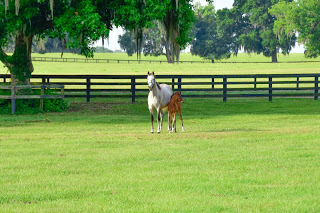
Most home buyers get an inspection performed before closing on a house. The same rule applies to purchasing an equestrian property, only there is more to inspect. Whether you hire a professional or size things up as you scope out available properties, make sure to check on the condition of anything built on the property, including fences, sheds, and barns. As far as the home itself goes, you want a house you’ll be happy in that meets your family’s needs. Some equestrian properties already have residences; others will require that you build a house yourself.
When it comes to equine facilities, the layout is just as important as the condition of the structures. Consider the following factors when you visit a potential property:
● Age of horse stalls and buildings
● Any extra features
● Other buildings
● Type of fencing (you don’t want barbed wire)
● Waste management and drainage systems
● Plumbing, hot water heater, and electricity
● How well-maintained and safe the structures are overall
As with any big decision, you need to weigh your preferences and priorities. Anything can be built or renovated, but you don’t want to overpay for a property in need of major repairs. If the farm structures are in good condition, but the house is outdated, you may decide to live with that until you can do some renovating. Since equestrian properties are a niche real estate market, there won’t be endless options. Try to find a good compromise that gives you most of what you want, if not everything.
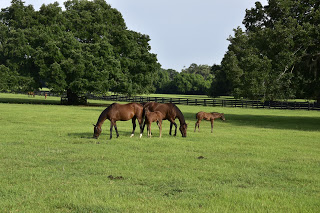
Unlike the typical residential property, equestrian properties require the use of potable water in both your home and the barn. The number of horses you own will determine how much potable water you use for the barn, but it can easily exceed the number of gallons you go through in your living space.
If you’re not hooked up to a public water supply (as is common in rural areas), you’ll need to have one or more dependable wells on your property. Sometimes a stream, lake or pond on your property can supply water for irrigation needs related to pastures and hayfields. Horses also require water for bathing and general health. Besides hydration, drinking water aids a horse’s digestion. Overall, you can expect that each of your horses will drink up to 10 gallons a day.
If you’re buying raw land to build your own equestrian property, make sure you understand the water rights (if there are any surface bodies of water) accompanying the property. That includes the ability to build a well in the future. In Florida, Best Management Practices are used to protect local water resources, and need to be considered before you purchase a property. Local environmental laws and regulations may also dictate your use of water on your property, so do your research before signing on the dotted line.
Assess the property’s rainwater drainage
Speaking of water, the one kind you don’t want to have in abundance is rainwater. First, determine that the property isn’t in a flood zone. Depending on the type of soil on your property, poorly drained land can create a maintenance headache and harm horses’ hooves. So look for well-drained soil and/or graded layouts that will keep your property dry where it needs to be.
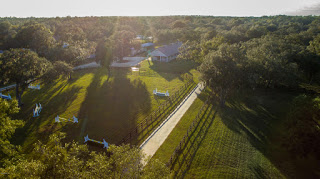 If water is not properly irrigated, it can cause damage to your property, neighboring properties, and nearby water supplies. Erosion and flooding can severely damage fencing, stables, and other structures, which could lead to serious injuries.
If water is not properly irrigated, it can cause damage to your property, neighboring properties, and nearby water supplies. Erosion and flooding can severely damage fencing, stables, and other structures, which could lead to serious injuries.Identify existing vegetation
From both a practical and an aesthetic perspective, you’ll want to know what plants and trees are already growing on the property. In terms of beauty, a woodsy backdrop or tree-lined drive may give the property an irresistible charm. Practically speaking, vegetation can serve as a clue to the state of the land. For example, wetland plants signal boggy soil, some plants indicate a nutrient deficit, and you’ll want to avoid certain noxious or invasive weeds. Once you have an inventory, consult with a local horticulture expert to find out what species are native to your area and what you don’t want on your property.
Research local zoning laws
Besides checking out the laws and regulations for water rights and land usage, you’ll want to research any other local zoning laws or ordinances that could be an issue. Make sure the property is already zoned agriculture. Ask town officials if there are any restrictions on structure placement or other building codes you need to be aware of. An experienced equestrian property real estate agent can also help you navigate zoning concerns.
Author Bio
A Brokerage With Distinction Showcase Properties of Central Florida is proud to help home and farm buyers from across the country discover the unique and exceptional lifestyle that an Ocala equestrian property can offer. We are a team of professionals dedicated to helping discerning buyers find their place in the Horse Capital of the World™, and passionate about making the local equestrian community flourish. North Central Florida is where we live, work, and play—meaning we’re invested in helping customers become neighbors, friends, and valued members of the local community. Become part of Marion County’s rich equestrian legacy and Discover Ocala with us!
This article originally appeared on www.savvyhorsewoman.comand is published here with permission.
Find more articles in our sections on Barns & Stalls and Recreation & Lifestyle.






